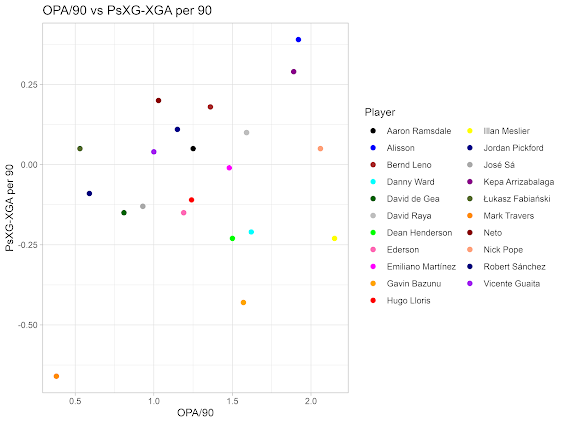De Geadache
Sweeping and keeping
In this entry, in consideration of David De Gea's impending contract renewal discussions, I looked at goalkeeper performance in the premier league. Data is provided by FBRef. Ideally the graph quality would be better but blogger's image compression has defeated me on this occasion.
This graph shows a selection of data points for premier league goalkeepers. On the y-axis is PsXG-XGA per 90, in essence this is a metric that measures a goalkeeper's shot stopping ability. On the x-axis is OPA/90, namely, the number of times a goalkeeper makes a defensive action i.e. clearing the ball outside their penalty area per 90 minutes. This can be a useful measure of the proactivity of a goalkeeper in protecting the space behind his defenders. This data set was filtered to remove any goalkeeper with less than ten 90s in the premier league this season.
David de Gea will naturally already be well-known to practically all football fans and recently acquired Manchester United's clean sheet error. He has a reputation, if undeserved, as a strong shot-stopper albeit with limitations in terms of his distribution and box presence. The analysis above indicates that he has regressed as a goalkeeper, losing his ability to make an above-average contribution in the net whilst retaining the same disadvantages.
As seen above, De Gea ranks poorly for both his shot-stopping ability and his overall defensive presence. Conceding around -0.15 PsXG-XGA/90 reflects the fact that De Gea simply hasn't retained his ability to prevent goals at an elite level. This is a far cry from his genuinely outstanding 2017/18 season in which he recorded +0.34. For context, only Alisson can better those numbers in this data set at +0.39. Put simply, the crutch on which De Gea could rest his comparative disadvantages in other areas has simply evaporated. He is actively harming rather than helping his team with consistently below average performances.
Over the course of a 38 game season, assuming this rate remains equal, this could amount to an extra 5.7 goals conceded and the unfortunate corollary of valuable dropped points. Alternatively this value suggests a contribution of 3.9 of United's 35 conceded goals this season have come simply from De Gea's underperformance. In an incredibly competitive league which has seen a mere point separate title winners from contenders any continuation of this form could ultimately blunt Erik Ten Hag's mission to turn United into a successful side.
Equally, ETH's arrival at Old Trafford would have hypothetically seen a transformation into a possession-based side. One typical facet of this includes playing a high defensive line. This allows the team to compress the space on the pitch, facilitates counter-pressing and creates high ball recoveries or defensive transitions. This aspect has failed to materialise. United's average defensive line height of 41.22 ranks 17th in the league. For comparison, league leaders Arsenal and Manchester City boast line heights of 50.82 and 51.69 respectively, nearly 10 metres further up the pitch. In the absence of a crystal ball to read ETH's thoughts, I can only surmise that much of this stems from De Gea's particular inactivity behind his defenders.
De Gea ranks 27th amongst all premier league goalkeepers this season for OPA/90 with a paltry number of 0.81. Ivan Meslier dwarfs this number with a comparative 2.15! In all fairness, De Gea has shown a limited proclivity for this, improving this season by around 22% and has a career peak of 1.10 OPA/90 in 2020/21. Even assuming that he could hypothetically achieve this peak again, this would only place him at 19th. De Gea's inability to manage the space in front of his goal has systemic effects that ripple dangerously. United's lower defensive line height leads to greater space further up the pitch, reduces the effectiveness of the overall pressing system and ultimately leads to conceding more changes than would potentially otherwise be probable. Obviously, no one statistic is monocausal, and there are likely other factors influencing this including potential tactical instructions. Nonetheless ETH's teams have historically played in a press-and-possess style with a high line and press conference comments made by the man himself have suggested a similar desire at United.
Notwithstanding the capital spending required to replace De Gea, I would argue that United would be well served to consider an alternative this summer. The knock-on effect of employing a goalkeeper with the ability to protect the goal and assure defenders higher up the pitch would be significant. This is before any consideration or analysis of De Gea's inability to distribute the ball with sufficient efficiency.
.png)
Comments
Post a Comment